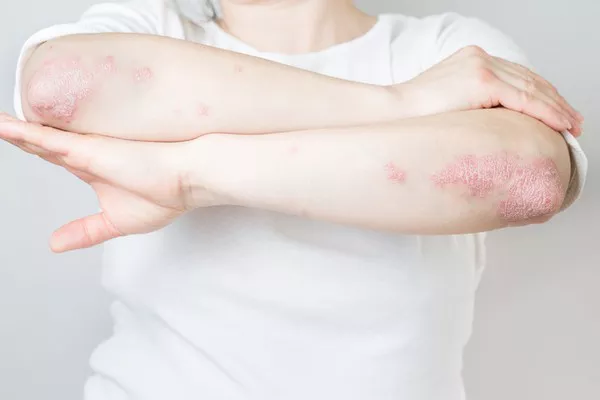Psoriasis is a chronic autoimmune condition characterized by the rapid buildup of skin cells, leading to the formation of red, scaly patches that can be itchy, painful, and aesthetically distressing. While there is no cure for psoriasis, effective management involves minimizing triggers and irritants that can exacerbate symptoms. One crucial aspect of this management is being mindful of the products applied to the skin. In this article, we will delve into the common irritants and triggers to avoid, the importance of patch testing, and provide recommendations for psoriasis-friendly alternatives.
Common Irritants and Triggers
1. Harsh Chemicals:
Many skincare and personal care products contain ingredients that can aggravate psoriasis symptoms. Alcohol, fragrances, dyes, and certain preservatives are among the culprits. Alcohol-based products can strip the skin of its natural oils, leading to dryness and irritation. Fragrances and dyes may cause allergic reactions or further inflammation in sensitive skin.
Examples of products to avoid include heavily scented lotions, perfumes, and soaps. Opting for fragrance-free and hypoallergenic alternatives can help minimize the risk of irritation.
2. Abrasive Materials:
Rough fabrics, harsh scrubbing tools, and abrasive exfoliants can exacerbate psoriasis by causing physical trauma to the skin. Scratching or rubbing affected areas vigorously can lead to increased inflammation and potentially worsen flare-ups.
It is advisable to choose soft, breathable fabrics like cotton and gentle cleansing tools such as soft sponges or washcloths. Avoiding harsh exfoliation methods and opting for gentle, circular motions during cleansing can help prevent skin irritation.
3. Specific Skincare Ingredients to Avoid:
While some skincare ingredients may benefit certain skin conditions, they can be problematic for individuals with psoriasis. Salicylic acid, commonly found in acne treatments and exfoliating products, can be too harsh for psoriasis-prone skin, especially in high concentrations. Certain essential oils, such as lavender or tea tree oil, may also trigger allergic reactions or irritation in some individuals.
When selecting skincare products, it is essential to scrutinize ingredient lists and steer clear of those known to exacerbate psoriasis symptoms. Consulting with a dermatologist can provide personalized recommendations based on individual skin sensitivities and needs.
Environmental Triggers
1. Weather Conditions:
Environmental factors play a significant role in triggering psoriasis flare-ups. Dry air, cold temperatures, and excessive sun exposure can all contribute to worsening symptoms. Cold weather can strip the skin of moisture, leading to dryness and increased itching. Conversely, excessive sun exposure can trigger inflammation and potentially lead to sunburn, which can exacerbate psoriasis lesions.
Protecting the skin from harsh weather conditions by using moisturizers and wearing protective clothing, such as hats and long sleeves, can help minimize flare-ups. Additionally, using a humidifier indoors can help maintain optimal moisture levels in the air, especially during the colder months.
2. Stress:
Stress is a well-known trigger for psoriasis flare-ups. While the exact mechanisms linking stress to psoriasis are not fully understood, it is believed that stress can weaken the immune system and contribute to inflammation, thus exacerbating symptoms. Managing stress through relaxation techniques, such as meditation, yoga, or deep breathing exercises, may help reduce the frequency and severity of flare-ups.
3. Smoking and Alcohol:
Lifestyle factors such as smoking and excessive alcohol consumption can also impact psoriasis. Both smoking and alcohol have been associated with increased inflammation and immune dysfunction, which can worsen psoriasis symptoms and decrease the effectiveness of treatment.
Quitting smoking and moderating alcohol intake may lead to improvements in psoriasis symptoms and overall skin health. Seeking support from healthcare professionals or support groups can aid in making lifestyle changes and maintaining long-term success.
Importance of Patch Testing
Before incorporating new skincare products into a psoriasis management regimen, it is essential to conduct patch tests to assess their compatibility with sensitive skin. Patch testing involves applying a small amount of the product to a small area of unaffected skin and observing for any adverse reactions over a period of time.
Alternatives and Recommendations
Gentle, Psoriasis-Friendly Skincare Options: Opting for gentle, fragrance-free moisturizers and cleansers can help soothe and hydrate psoriasis-prone skin without causing further irritation. Look for products labeled as hypoallergenic or specifically formulated for sensitive skin.
Consultation with a Dermatologist or Healthcare Professional: While general guidelines can be helpful, every individual’s experience with psoriasis is unique. Consulting with a dermatologist or healthcare professional can provide personalized advice and treatment plans tailored to specific needs and preferences. They can also offer recommendations for prescription medications or advanced treatment options for more severe cases of psoriasis.
Conclusion
In conclusion, being mindful of the products applied to psoriasis-prone skin is crucial for managing symptoms and minimizing flare-ups. By avoiding common irritants and triggers, conducting patch tests before introducing new products, and seeking guidance from healthcare professionals, individuals with psoriasis can better manage their condition and improve their quality of life.
























